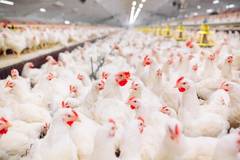
- Industry news
Industry news
- Category news
Category news
- Reports
- Key trends
- Multimedia
- Journal
- Events
- Suppliers
- Home
- Industry news
Industry news
- Category news
Category news
- Reports
- Key trends
- Multimedia
- Events
- Suppliers
Chicken cull ordered on UK farm after avian flu outbreak
Key takeaways
- Thousands of chickens are to be culled after the suspected outbreak of highly pathogenic avian influenza.
- Temporary Control Zones have been introduced to contain the potential spread.
- Chief veterinary officer Brian Dooher and Minister Andrew Muir have called on all bird owners to maintain high biosecurity and report any signs of illness.

The UK’s Department of Agriculture, Environment and Rural Affairs (DAERA) has introduced a series of control measures after a suspected case of notifiable highly pathogenic avian influenza (HPAI) was discovered in commercial poultry premises in County Tyrone, Northern Ireland. The measures include culling all the poultry on the site.
The suspected case was reported last Friday (October 3), and initial results suggest the presence of notifiable HPAI. The National Reference Laboratory is carrying out further tests to confirm the strain.
The cull is understood to affect around 20,000 chickens.
DAERA minister, Andrew Muir, says: “The CVO has taken the decision, as a precautionary measure, to apply appropriate disease control measures, including the humane culling of all poultry on the site, and the introduction of Temporary Control Zones (TCZ) to mitigate for onward disease spread.”
“This suspect incursion of HPAI is a stark reminder that we cannot afford to be complacent. It is imperative that all bird owners, from backyard hobbyists to commercial flock keepers with thousands of birds, adhere to all biosecurity measures to protect their flocks.”
Bolstering security
Poultry farmers are being urged to review their biosecurity measures to prevent further outbreaks.
Chief veterinary officer, Brian Dooher, says: “The disease control measures are crucial to limit any potential spread of disease, and I appeal to all bird owners, backyard, and commercial, to take all necessary steps to protect your flock. This includes ensuring continuous excellent levels of biosecurity, and reporting any suspect cases of avian flu to DAERA immediately.”
“Should HPAI be officially confirmed, these TCZs will be revoked and replaced with a 3 km Protection Zone and 10 km Surveillance Zone.”
Avian Influenza is primarily a disease of birds, and the risk to the general public’s health is very low. The Food Standards Agency has also advised that Avian Influenza poses a very low food safety risk for UK consumers, and that properly cooked poultry and poultry products, including eggs, are safe to eat.
Last month, the European Food Safety Authority and the European Commission unveiled a toolkit to help farmers safeguard poultry and consumers from avian influenza.











